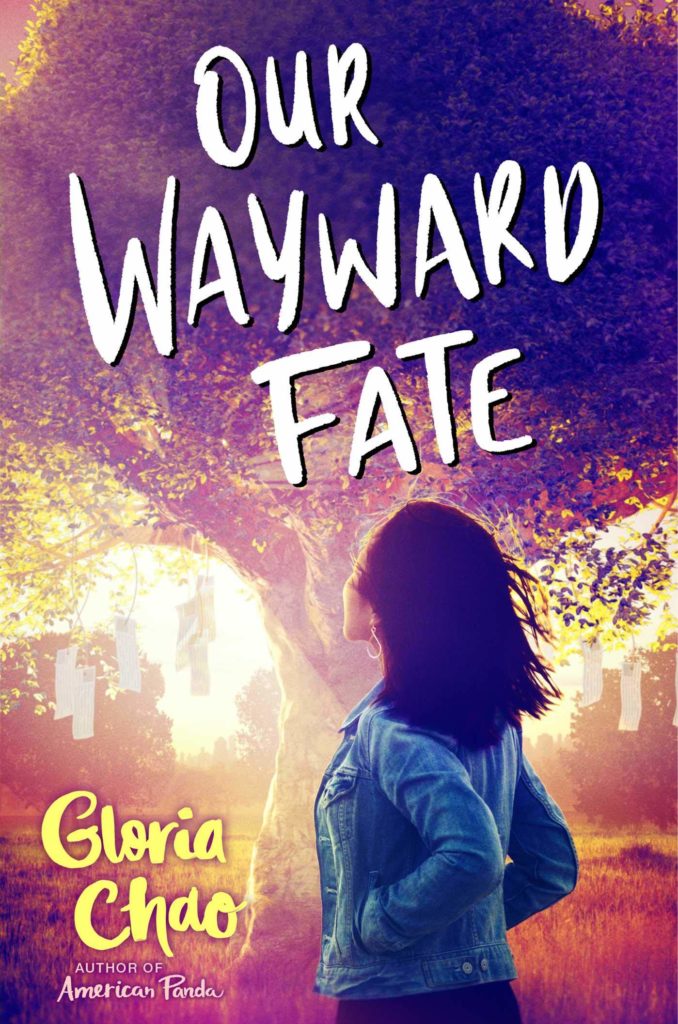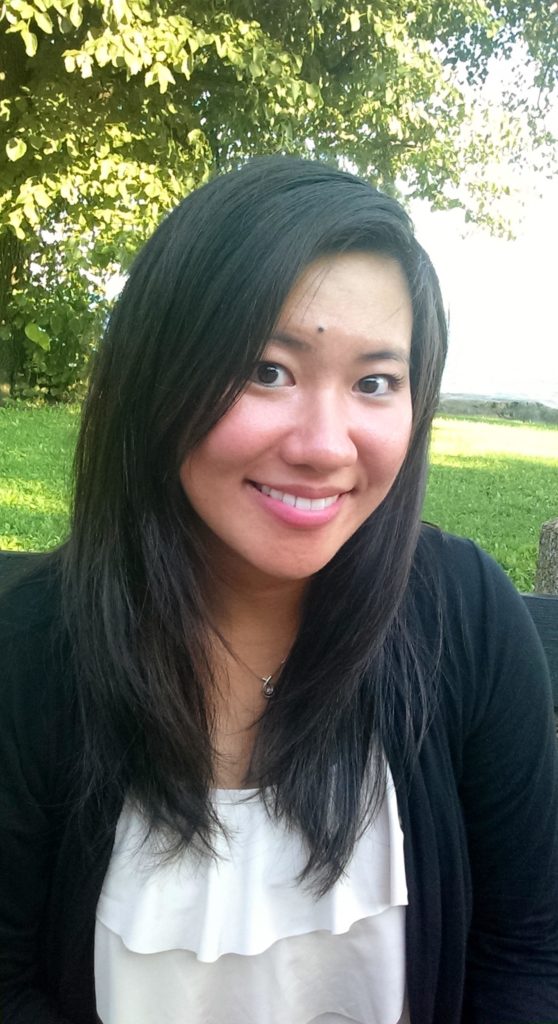After finishing Our Wayward Fate I knew I had to reach out to Gloria for an interview. I don’t even have the words to write a cohesive review of Our Wayward Fate. I could go on and on about the plot which will keep you reading until long after you needed to leave the house. Or the characters which will charm you with their love of puns. But the icing on the cake was the way I could relate to Ali’s struggles as one of the few Asian Americans in her mostly white neighborhood.
Our Wayward Fate

Seventeen-year-old Ali Chu knows that as the only Asian person at her school in middle-of-nowhere Indiana, she must be bland as white toast to survive. This means swapping her congee lunch for PB&Js, ignoring the clueless racism from her classmates and teachers, and keeping her mouth shut when people wrongly call her Allie instead of her actual name, Ah-lee, after the mountain in Taiwan.
Her autopilot existence is disrupted when she finds out that Chase Yu, the new kid in school, is also Taiwanese. Despite some initial resistance due to the they belong together whispers, Ali and Chase soon spark a chemistry rooted in competitive martial arts, joking in two languages, and, most importantly, pushing back against the discrimination they face.
But when Ali’s mom finds out about the relationship, she forces Ali to end it. As Ali covertly digs into the why behind her mother’s disapproval, she uncovers secrets about her family and Chase that force her to question everything she thought she knew about life, love, and her unknowable future.
Find Our Wayward Fate on Goodreads, Amazon, Indiebound & The Book Depository.
Interview
I am a huge fan of the mother/daughter relationship in OUR WAYWARD FATE. It’s complex and there’s a lot of good intentions even if they’re misplaced. Can you talk about some of the inspiration and describe these two characters for new readers?
Thank you so much. Both Ali and her mother love each other but don’t know how to express it. They have a generational and cultural divide neither know how to surmount, leading to hurtful secrets they keep for what they believe to be the right reasons. These secrets build over the course of the book and inevitably come to a head.
This was inspired by my own difficulties communicating with my parents, which became especially stark when I switched careers. My parents disapproved because they were worried about my future as a writer (fair), and I wasn’t effectively communicating how miserable I was as a dentist or what my long-term plan was. Over the course of writing American Panda, we learned to communicate better, and years later, my parents are now very supportive.
Where did you get the inspiration for this story? I love how the elements of the Butterfly Lovers is so seamlessly woven in. I saw someone describe it as a re-imagining of the story, but I feel like yours is way more than that! And it functions in a different way that a conventional re-telling might.
Thank you! The idea for Our Wayward Fate came about when my mother sent me a newspaper article about a park in Hangzhou dedicated to The Butterfly Lovers with a unique tradition. It fascinated me so much that I knew I wanted to write a book about it. And because I grew up hearing The Butterfly Lovers story, I wanted to find a way to bring this famous folk tale to a new set of readers.
The re-imagining of The Butterfly Lovers appears as short interstitials between Ali’s narrative, and I pictured these as breadcrumbs for the reader. At first, they aren’t related, but soon the reader knows this will be the answer to what Ali is searching for—the why behind Ali’s mother forbidding her romance with Chase. I was hoping to give the reader a head start on the answers, though I hope the end is still a surprise.
Part of what resonated so strongly with me is Ali’s experiences assimilating to her mostly white neighborhood and the self-erasure. Can you talk about what it was like to write Ali’s character?
It means so much to me that you resonated with Ali’s experiences, and I’m also so sorry you had to go through that. Writing this part of Ali’s story was, unfortunately, not difficult. I didn’t have to reach far for the way the other students mistreat her or the way she reacts. Writing her at the beginning was painful, but it was satisfying when she found her voice. While that means something different for everyone, for a fighter like Ali, she remembers how to stand up for herself.
What was it like to write OUR WAYWARD FATE which is your second book? The sophomore slump?
Our Wayward Fate was easier to write because of all the growing pains I’d gone through with the drafting and revising of American Panda. However, a new struggle was learning how to continue writing as my first book made its way into the world. It took me a little time to quiet the other voices and find my groove again, but luckily, it hasn’t been much of an issue as I work on my third book, Rent a Boyfriend.
And I do have to take this opportunity to say that hearing your reaction to the book helped me so much. You were the first to resonate this personally with the story, and once Ali found her way to you, I was able to let go of pressure I was putting on myself. Thank you for that. I can’t tell you how much it means.
What is a genre you have always admired, but haven’t written yet?
After a decade away during high school and college, I found my way back to reading because of dystopian and fantasy books. I hope one day to write one. However, there are still so many contemporary ideas I want to explore that it likely won’t be for some time. While fantasy holds a special place because I loved them first, contemporary is where my heart lies.
American Panda is one of the covers that comes to mind clearly when I think of POC specifically Asian faces on covers. Can you talk about the cover design process?
I have been incredibly lucky with all of my covers. Simon Pulse does a fabulous job with them, and they value POC representation. For each one of my covers, Pulse sends me a close-to-final version, and they’ve all come to me with Asian people on them, for which I’ve been so grateful. (Yes, you can take that as a hint for the Rent a Boyfriend cover, which I’ve seen and love!) Sarah Creech and Laura Eckes do amazing work, and I’m proud to be at an imprint that celebrates diversity and isn’t afraid to show it on their book covers.
What have been your recent obsessions? Books, TV, film?
I am sad to say I haven’t had as much time for reading as I would like because of Rent a Boyfriend deadlines (and I find it difficult to read after a more than full day of writing), but I recently read and loved Suzanne Park’s April 2020 book, The Perfect Escape, and I’m currently loving Rachel Lynn Solomon’s Today Tonight Tomorrow (6/2020). And as for books on my TBR, I’m so excited for Stacey Lee’s The Downstairs Girl, Kimberly Gabriel’s Every Stolen Breath (11/2019), Lamar Gile’s Not So Pure and Simple (1/2020), Ronni Davis’s When the Stars Lead to You (11/2019), and Rena Barron’s Kingdom of Souls.
For film, I recently loved The Farewell, Plus One, Edge of Seventeen, Lady Bird, and Overboard. And some TV shows I’m loving: Pen15, South Side, The Other Two, Corporate, Schitt’s Creek, and I am a huge, huge fan of Brooklyn Nine-Nine. My husband and I have watched every episode too many times. No surprise it makes a cameo in Rent a Boyfriend.
Find Our Wayward Fate on Goodreads, Amazon, Indiebound & The Book Depository.
About the Author

Gloria Chao is the critically acclaimed author of American Panda, Our Wayward Fate (releasing October 15, 2019), and Rent a Boyfriend (fall 2020).
Her wayward journey to fiction included studying business at MIT, then becoming a dentist. Gloria was once a black belt in kung-fu and an avid dancer, but nowadays you can find her teaming up with her husband on the curling ice.
AMERICAN PANDA received four starred trade reviews, is a Junior Library Guild Selection and Indie’s Next Pick, and is a Seventeen Magazine, Bustle, PopSugar, Chicago Public Library, and Paste Magazine Best YA Book of 2018.